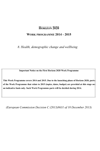 The Horizon 2020 societal challenge of 'health, demographic change and wellbeing' (SC1) for the years 2014 and 2015 includes 34 topics in the 'personalising health and care' focus area call (15 in 2014 only, 17 in 2015 only and 2 which are open in both years) and 16 topics in the 'co-ordination activities' call (11 in 2014 and 5 in 2015). 8 other actions designed to support the implementation of the challenge are also included and are not subject to competitive calls for proposals. The total budget available is approximately EUR 1.21 bn.
The Horizon 2020 societal challenge of 'health, demographic change and wellbeing' (SC1) for the years 2014 and 2015 includes 34 topics in the 'personalising health and care' focus area call (15 in 2014 only, 17 in 2015 only and 2 which are open in both years) and 16 topics in the 'co-ordination activities' call (11 in 2014 and 5 in 2015). 8 other actions designed to support the implementation of the challenge are also included and are not subject to competitive calls for proposals. The total budget available is approximately EUR 1.21 bn.
The choice to focus on personalising health and care is informed by the ageing of the European population, an increasing communicable and non-communicable disease burden and the fall-out from the economic crisis. In combination, these factors are jeopardising the sustainability and equity of European health and care systems, on which Europe already spends nearly 10% GDP.
The personalising health and care call aims to create opportunities for real breakthrough research and radical innovation in response to these challenges, by supporting the translation of findings into the clinic and other health and care settings to improve health outcomes, reduce health inequalities and to promote active and healthy ageing.
Topics in the call are divided into 7 areas which reflect the need for a translational and integrated approach to the challenge, providing support both to longer and mid-term research as well as to shorter term innovation activities. Topics in the areas of 'understanding health...' and 'improved health information and data exploit ation' provide underpinning, longer term support to topics in the areas of 'prevention...', 'diagnosis...', 'treatment...', 'advancing active and healthy ageing' and 'delivering integrated, sustainable and citizen centred care'.
Taken together, work to be supported by these topics will improve our understanding of the causes and mechanisms underlying health, healthy ageing and disease; improve our ability to monitor health and to prevent, detect, treat and manage disease; support older persons to remain active and healthy; and test and demonstrate new models and tools for health and care delivery. In doing so, support will be provided to research and innovation performers, including significant, tailored support to small and medium sized enterprises, in particular through topic PHC 12 which makes use of the new SME instrument.
Download: Horizon 2020, Work Programme 2014-2015: Health, Demographic Change and Wellbeing (.pdf, 1.120 KB).
Download from eHealthNews.eu Portal's mirror: Horizon 2020, Work Programme 2014-2015: Health, Demographic Change and Wellbeing (.pdf, 1.120 KB).
This Work Programme covers 2014 and 2015. Due to the launching phase of Horizon 2020, parts of the Work Programme that relate to 2015 (topics, dates, budget) are provided at this stage on an indicative basis only. Such Work Programme parts will be decided during 2014.